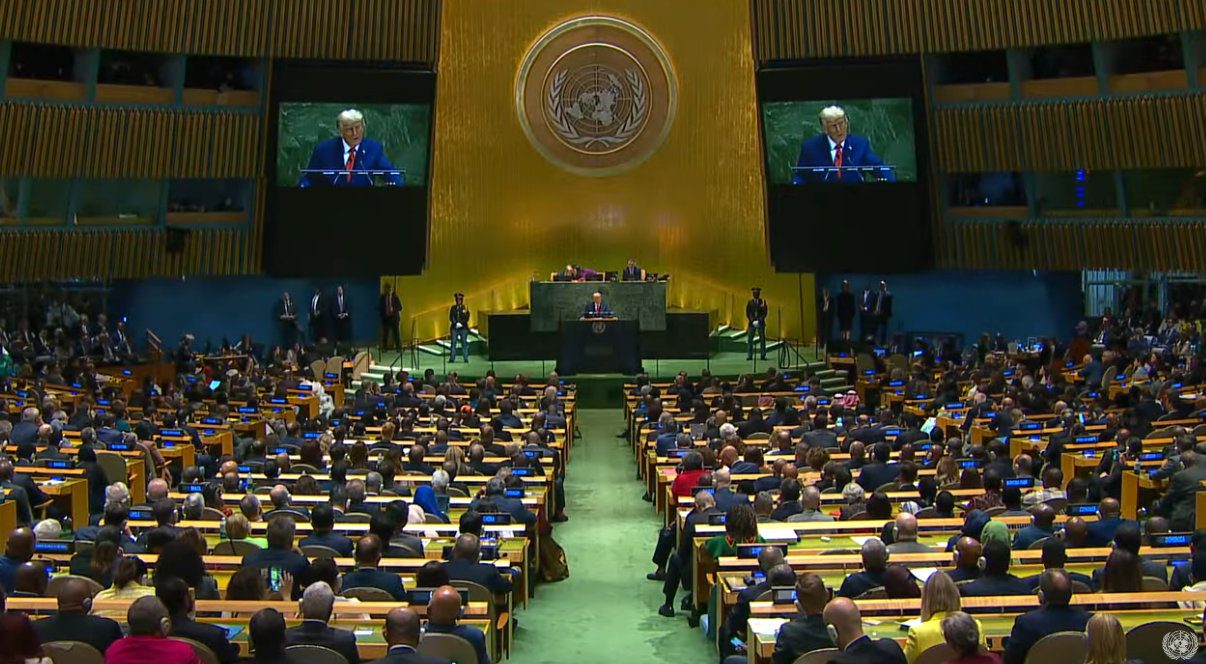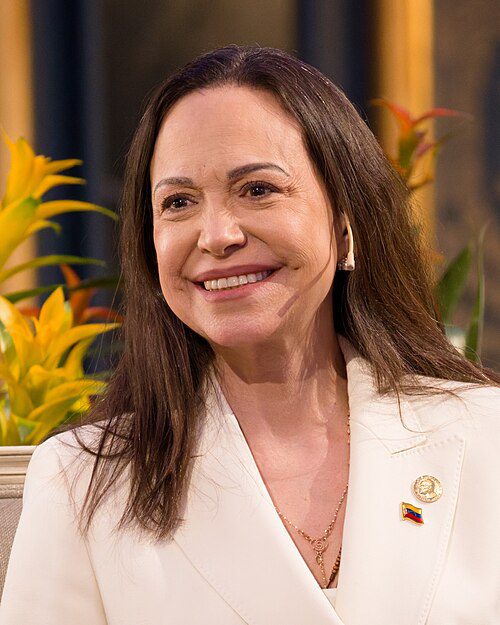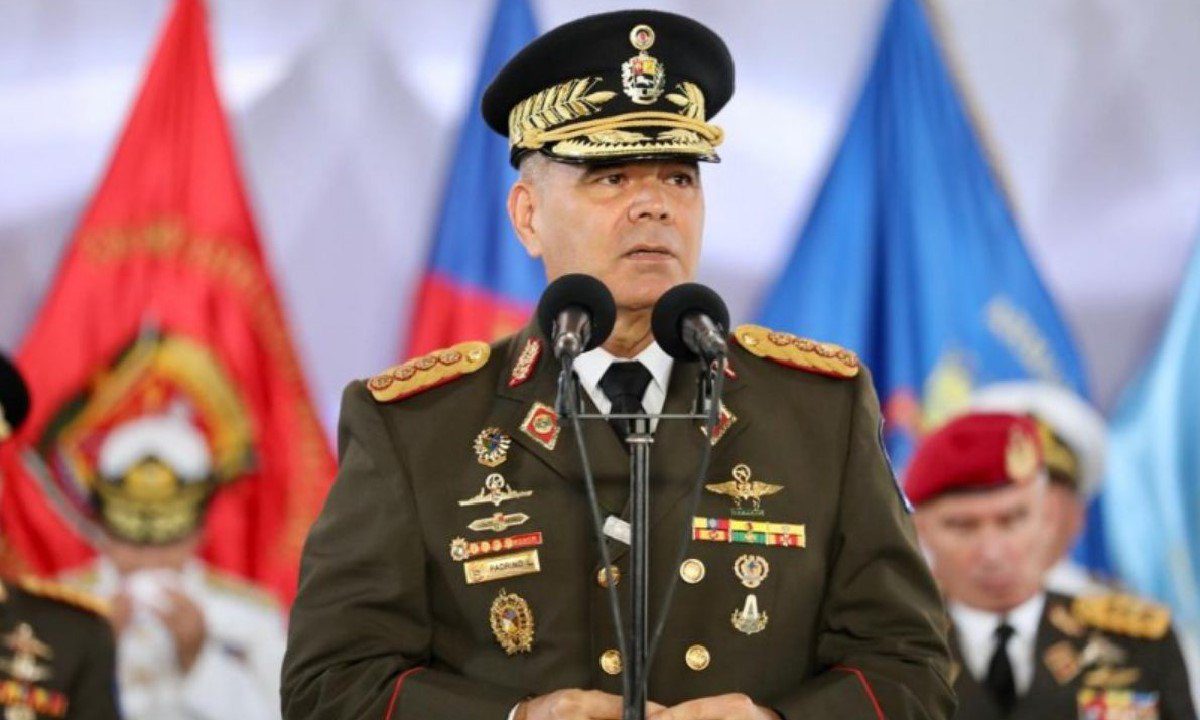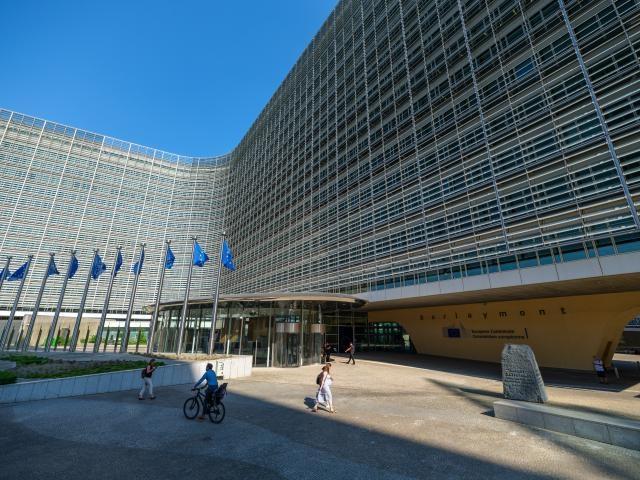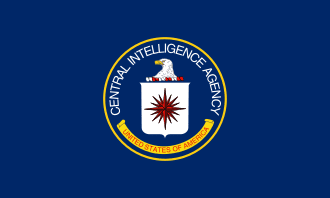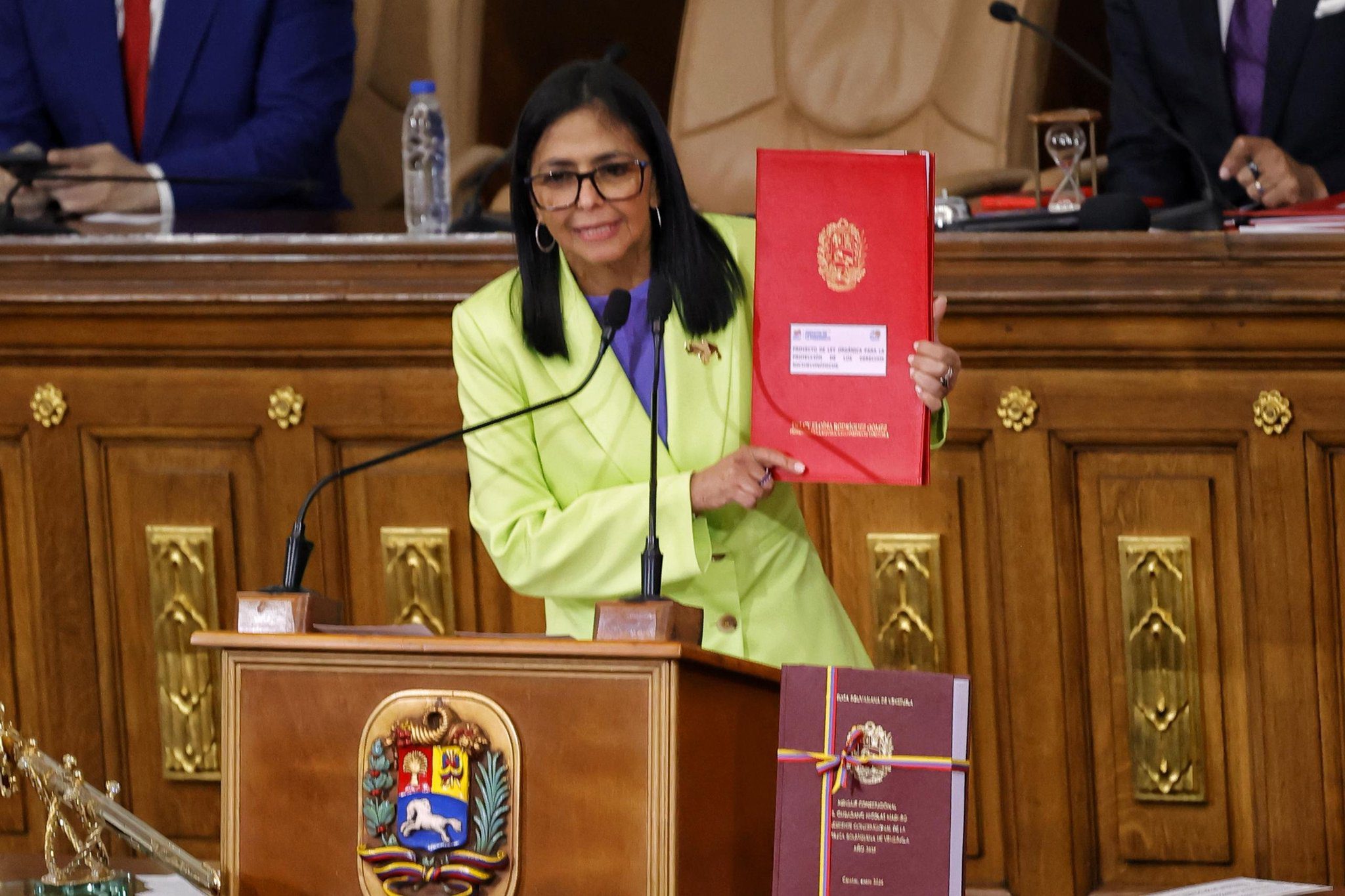Delegations observe Donald Trump, President of the United States, as he delivers his speech before the UN General Assembly, in which he referred to Venezuela, while maintaining a military deployment in the Caribbean. Photo: UN PHOTO
Guacamaya,September 25, 2025. Within the framework of the 80th session of the United Nations General Assembly, Venezuela deployed an international agenda marked by intense diplomatic activity from both the government and a sector of the opposition. While the administration of Nicolás Maduro held more than twenty meetings with countries and international organizations in New York, reinforcing its narrative of integration and multipolarity, the opposition linked to María Corina Machado concentrated its efforts on highlighting the Venezuelan crisis as a hemispheric security problem, with activities in New York and Geneva. This dual agenda reflects the dispute for legitimacy and international projection among the different Venezuelan political actors in a transforming global scenario.
Agenda of the Maduro Administration
Qatar
Yván Gil held a meeting with Mohammed bin Abdulaziz bin Saleh Al Khulaifi,Minister of State at the Ministry of Foreign Affairs of Qatar. Both nations ratified their commitment to constructive international cooperation.
Gambia
The Venezuelan chancellor met with Sering Modou Njie,Minister of Foreign Affairs, International Cooperation and Gambians Abroad, with whom he assured that “dialogue and bilateral cooperation were strengthened.”
Niger
Gil spoke with Yaou Sangaré Bakary,Minister of Foreign Affairs, Cooperation and Nigeriens Abroad, highlighting the principles of “bilaterality, diplomacy and mutual cooperation.”
Cuba
In a meeting with his counterpart Bruno Rodríguez,Venezuela and Cuba ratified what they consider “the shared commitment to defending peace in Latin America and the Caribbean in the face of tensions with the United States.”
Belarus
Yván Gil met with Maksim Ryzhenkov,Minister of Foreign Affairs of Belarus. Both parties reaffirmed their “commitment to peace and the self-determination of peoples.”
Saint Vincent and the Grenadines
The Venezuelan chancellor and Prime Minister Ralph Gonsalves highlighted cooperation within the framework of ALBA-TCP,especially through the Agroalba program, aimed at regional food sovereignty.
Sudan
Gil held a meeting with Mohieldin Salim Ahmed Ibrahim,Sudanese Minister of Foreign Affairs and International Cooperation, in which “friendship and bilateral ties” were reaffirmed.
Sri Lanka
The Venezuelan chancellor spoke with Vijitha Herath,Minister of Foreign Affairs, Tourism and Employment Abroad, about the possibility of expanding bilateral rapprochement.
Dominica
Gil met with Vince Henderson,Minister of Foreign Affairs, International Business, Trade and Energy, with whom he reaffirmed “the commitment to integration and regional solidarity.”
Namibia
In a meeting with Selma Ashipala-Musavyi,Minister of International Relations and Cooperation, Venezuela recognized Namibia’s historical stance in defense of peoples against blockades and occupations.
Mozambique
The Venezuelan chancellor spoke with María Manuela dos Santos Lucas,Minister of Foreign Affairs and Cooperation, with whom they “ratified the commitment to expand instruments of cooperation.”
Vietnam
Yván Gil and Le Hoai Trung,Minister of Foreign Affairs of Vietnam, reaffirmed the bonds of brotherhood, bilateral cooperation and multilateral alliance.
Kenya
The Venezuelan chancellor met with Musalia Mudavadi,Cabinet Secretary for Foreign and Diaspora Affairs, with whom he reviewed bilateral relations initiated in 1970 and agreed to advance a joint commission to expand cooperation.
International Committee of the Red Cross (ICRC)
Gil spoke with Mirjana Spoljaric Egger,the ICRC’s top representative to the UN, about strengthening the framework of cooperation with Venezuela.
China
Vice Minister Tatiana Pugh participated in the forum on the Global Governance Initiative presented by China,ratifying Venezuela’s support for this proposal.
Nicaragua
Yván Gil met with Denis Moncada,Minister of Foreign Affairs of Nicaragua, to “reaffirm bilateral cooperation and the commitment to regional integration.”
Serbia
The Venezuelan chancellor held a meeting with Marko Đurić,Minister of Foreign Affairs of Serbia, in which they addressed the strengthening of diplomatic, economic and commercial ties.
Belize
Meeting with John Briceño,Prime Minister of Belize, in which both parties reaffirmed the historical ties of solidarity, highlighting initiatives such as PetroCaribe.
Zimbabwe
In a meeting with Amon Murwira,Minister of Foreign Affairs and International Trade, recent agreements on academic and intellectual exchange were ratified.
Rwanda
Gil held a meeting with Olivier Nduhungirehe,Minister of Foreign Affairs of Rwanda, in which both countries expressed “interest in expanding relations in cooperation and peace.”
Burkina Faso
The Venezuelan chancellor spoke with Karamoko Jean Marie Traoré,Minister of Foreign Affairs of Burkina Faso, about the broad range of bilateral cooperation, which includes science and technology.
Mali
In a meeting with Abdoulaye Diop,Minister of Foreign Affairs of Mali, the cooperation agenda in technological matters and joint development was reviewed.
Multilateral Participation
Vice Minister Rubén Darío Molina spoke at the Ministerial Meeting of the Group of 77+ China, where he highlighted the bloc’s role in the development of the Global South. Likewise, at the First Biennial Summit for a Sustainable, Inclusive and Resilient Economy, he ratified Venezuela’s commitment to the UN 2030 Agenda.
Assessment of the Official Agenda
During the high-level week of the 80th session of the UN General Assembly,Venezuela held meetings with:
Africa (10): Gambia, Niger, Sudan, Namibia, Mozambique, Zimbabwe, Rwanda, Burkina Faso, Mali, Kenya.
Asia (4): Qatar, Sri Lanka, Vietnam, China.
Caribbean (4): Cuba, Dominica, Saint Vincent and the Grenadines, Belize.
Latin America (1): Nicaragua.
Eastern Europe (2):Belarus, Serbia.
In total,there were 21 countries, plus one meeting with the International Committee of the Red Cross as an international organization.
Agenda of the Venezuelan opposition sector led by María Corina Machado
Members of the Comando con Venezuela organization,which groups together supporters of María Corina Machado, participated in the event organized by the United States titled “Dismantling Transnational Criminal Organizations in the Western Hemisphere,” which featured:
· Officials from the administration of President Donald Trump.
· Authorities from the State Department headed by Marco Rubio, one of Machado’s main allies in the United States.
· The Chancellor of Ecuador, Gabriela Sommerfeld.
· The Vice Chancellor of Argentina, Juan Navarro.
· High-level representatives from France, Italy, the Netherlands, Trinidad and Tobago, Costa Rica, Spain and the European Union.
The meeting revolved around international efforts against “organized crime,” in this opposition sector’s quest to position Venezuela as a matter of hemispheric security, a central axis in Machado’s strategy.
Bilateral meetings in New York
Costa Rica
Meeting with the Vice Minister of Multilateral Affairs,Ambassador Alejandro Solano Ortiz.
Guatemala
Meeting with the Minister of Foreign Relations,Ambassador Carlos Ramiro Martínez.
United States
Brief exchange with the Assistant Secretary of State,Christopher Landau, in which they expressed gratitude for what they called “the support for the democratic cause of Venezuela.”
Activities in Geneva
In the context of the publication of the new report by the Independent International Fact-Finding Mission on Venezuela,opposition leader Leopoldo López addressed the UN Human Rights Council, urging support for “the political transition in Venezuela” and the fight against what he calls the “Cartel of the Suns.”
Political Messages
Edmundo González Urrutia and María Corina Machado disseminated messages related to the UN General Assembly.
Assessment of the Opposition Agenda
Latin America (2):Costa Rica, Guatemala.
North America (1):United States.
Europe (3):France, Italy, Netherlands, Spain, European Union (counted as a bloc).
Caribbean (1):Trinidad and Tobago.
Multilateral organizations (2):UN Human Rights Council (Geneva), UN General Assembly (New York).
In total,the Venezuelan opposition sector held 6 direct bilateral interactions and participated in 2 relevant multilateral spaces.
For their part, opposition sectors headed by leaders such as Henrique Capriles Radonski, who remain in Venezuela and have distanced themselves from the strategy adopted by María Corina Machado after July 28, did not develop an international agenda at the United Nations and currently lack a broader agenda abroad.
Venezuela’s diplomatic deployment at the UN reflects the strategy of insertion into an increasingly multipolar international order,where countries of the Global South, especially Africa and Asia, are gaining greater prominence as political and economic partners. The ruling party sought to reinforce its narrative of integration and cooperation with emerging blocs and strategic allies, while the opposition focused its efforts on highlighting the Venezuelan crisis as a hemispheric security problem, with a marked anchor in the United States and Europe. These two agendas, although opposite in their objectives, evidence how the Venezuelan dispute transcends the domestic sphere and is projected onto the global geopolitical board: between the search for legitimacy in a fragmented world and the struggle for recognition in a scenario of depolarization and competition among spheres of influence.

